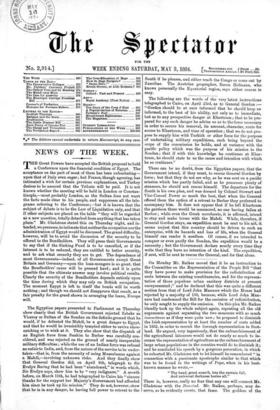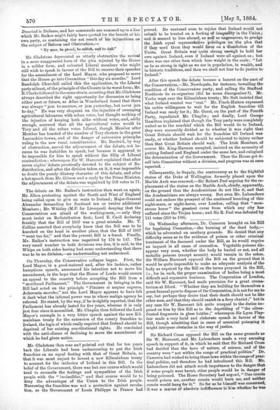On Monday Mr. Raikes moved that it be an instruction
to the Committee on the Representation of the People Bill "that they have power to make provision for the redistribution of seats between the existing constituencies, and for the represen- tation of those populous urban sanitary districts at present unrepresented ;" and he declared that this was quite a different motion from that of Lord John Manners which the House had rejected by a majority of 130, because, while Lord John Man- ners had condemned the Bill for the omission of redistribution, he only sought to supply the omission. On this plea Mr. Raikes blandly took up the whole subject again, repeating all the old arguments against separating the two measures with as much insouciance as if they were quite new ; he proposed to diminish the Irish representation by at least the number of seats added in 1832, in order to recruit the borough representation in Scot- land. He argued, very ingeniously, that the enfranchisement of the agricultural labourers would not do nearly so much to in- crease the representation of agriculture as the enfranchisement of large urban populations in the counties would do to diminish it; and he concluded his speech by a gorgeous peroration, in which he exhorted Mr. Gladstone not to let himself be remembered "in connection with a passionate apostrophe similar to that which was to be found in the writings of Pope, when in his best- known manner he wrote,— " Thy hand, great anarch, lets the curtain fall, And universal darkness buries all."
There is, however, really no fear that any one will connect Mr. Gladstone with the Dunciad. Mr. Raikes, perhaps, may de- serve, as be evidently covets, that fame. The goddess of the Dunciad is Dulness, and her commands are summed up in a line which Mr. Raikes might fairly have quoted for the benefit of his own party, as containing the net result of his injunctions on the subject of Reform and Obstruction,—
" My sons, be proud, be selfish, and be dull."



































